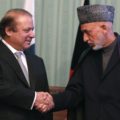
Pakistani demonstrators protest US aid cuts in Lahore –
Image processed by CodeCarvings Piczard | http://piczard.com | http://codecarvings.com
President Donald Trump’s decision to cut aid to Pakistan was long overdue.
Legitimate questions had been raised in the past concerning U.S. financial assistance to Pakistan. The Islamabad government has continued to turn a blind eye towards terrorist activities within its borders that threatened American interests and the safety of the U.S. citizenry, both civilian and military.
The U.S. State Department explains that “we are suspending security assistance, security assistance only, to Pakistan at this time until the Pakistani Government takes decisive action against groups, including the Afghan Taliban and the Haqqani Network. We consider them to be destabilizing the region and also targeting U.S. personnel.”
Some level of Washington’s outrage with Pakistan that led to the cutting of aid may date back to 2016, when Abubakar Siddique, writing in Gandhara, reported that “Sartaj Aziz, Pakistan’s adviser for foreign affairs, admitted that “Islamabad is housing senior Taliban leaders and has influence over them,” despite the fact his government had previously “vehemently denied giving shelter to Taliban leaders after their hard-line regime crumbled in late 2001…Aziz told participants at a Washington think tank event that Islamabad holds sway over the Afghan Taliban because the insurgent leaders and their families live in Pakistan and ‘get some medical facilities.’”
The Obama Administration may have set an example that induced Islamabad to deal with the Taliban as a legitimate political entity. In a 2014 American Enterprise Institute study, Ahmad K. Majidar pointed out that “After taking office in January 2009, President Barack Obama argued that ‘there will also be no peace without reconciliation,’ and negotiation with the Taliban became the main political pillar of Washington’s strategy in Afghanistan.”
The Obama Administration apparent dismissal of the concept of an American victory in the war against the Taliban may have also discouraged Pakistan. An American Interest article by Paul Miller, points out that “In contrast to his campaign rhetoric, Obama spent the rest of his presidency carefully avoiding saying that the United States aimed to ‘defeat’ the Taliban or ‘win’ the war. Rather like Lyndon Johnson 45 years earlier, the President escalated a war while simultaneously doubting whether it could be won…President Obama spent nearly his entire presidency talking about withdrawing from Afghanistan…the deadline emboldened the Taliban and undermined the surge.”
Obama’s negotiation with the Taliban was equally unsettling to the Kabul government. A 2012 Heritage Society study noted that “the lack of transparency surrounding current U.S. talks with the Taliban has raised concern among parts of Afghan civil society that the U.S. is straying from these parameters and is considering striking a closed-door deal with the Taliban in order to justify a rapid U.S. troop withdrawal, which would sacrifice the hard-won human rights and security gains made over the past decade. During its rule over Afghanistan in the late 1990s, the Taliban forbade girls and women from attending school, holding jobs, or leaving home without a male companion. The Taliban also conducted systematic human rights abuses against the ethnic minority Hazara community, including two civilian massacres that resulted in the murders of nearly 200 Hazaras in 2000 and 2001. The Taliban regularly carried out public executions and floggings at stadiums and banned television, music, and the Internet. While the media has reported on sporadic contacts between the U.S. government and Taliban leaders over the past two years, the substance of the discussions and the process under which they are taking place have been shrouded in mystery…”
Cutting aid to Pakistan in response to its contacts with the Taliban was appropriate and overdue. But in doing so, the mistakes made by the Obama Administration which played at least some part in the thinking of the Islamabad government should not be overlooked nor forgotten.
Frank Vernuccio serves as editor-in-chief of the New York Analysis of Policy & Government















Follow Us